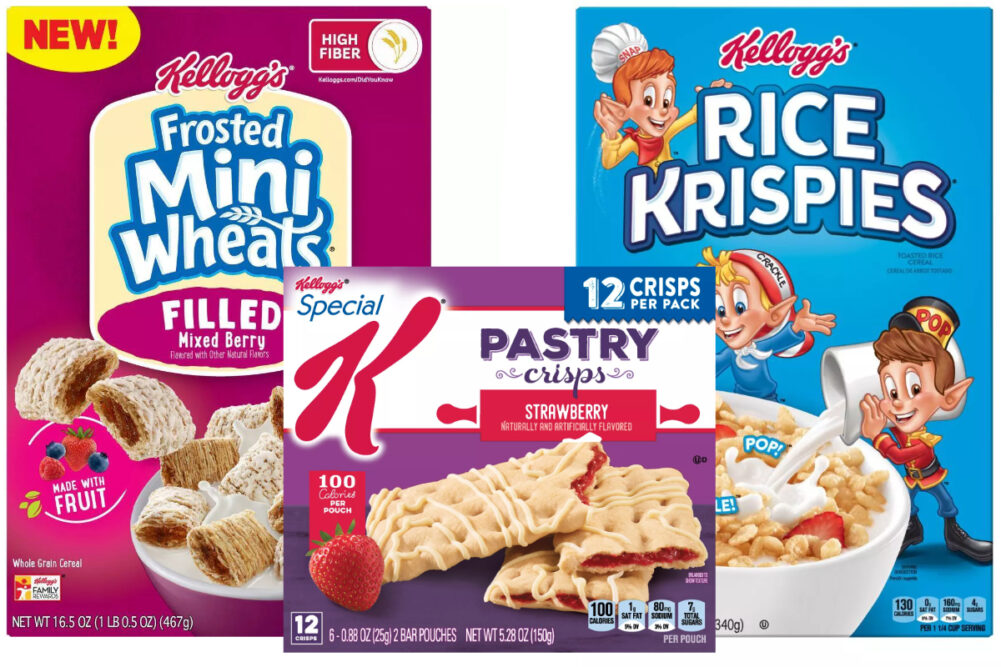BATTLE CREEK, MICH. — Kellogg Co. achieved a key goal for the fiscal year ended Dec. 28, 2019, even though a divestiture of businesses had a negative impact on both net sales and earnings.
“The primary goal of 2019 was to return to organic net sales growth, and we did that,” said Steven A. Cahillane, chief executive officer, in a Feb. 6 earnings call.
Battle Creek-based Kellogg in July completed the divestitures of several businesses that dealt with cookies, fruit snacks, pie crusts and ice cream cones.
Net income of $960 million, or $2.81 per share on the common stock, in the fiscal year was down 28% from $1,336 million, or $3.85 per share, in the previous fiscal year. Higher one-time charges and the absence of the divested businesses were offset partially by lower mark-to-market charges.
Net sales of $13,578 million were up 0.2% from $13,547 million in the previous fiscal year. Organic net sales increased 1.9%. Improved organic growth and the consolidation of Multipro, Kellogg’s distributor in West Africa, more than offset the adverse effects of the divested businesses and currency translation.
Kellogg in fiscal 2020 expects organic net sales to increase 1% to 2%.
“I wouldn’t call it pessimistic guidance,” Mr. Cahillane said. “I’d characterize it as prudent guidance.”
Adjusted earnings per share are forecast to decline by 3% to 4%. Shareholders did not respond favorably to the 2019 results and the 2020 outlook. The company’s share price on the New York Stock Exchange closed at $63.46 per share on Feb. 6, which was down more than 8% from the Feb. 5 close of $69.36 per share.
In North America, net sales in the fiscal year declined 3% to $8,390 million primarily because of the divested businesses. Operating profit dropped 13% to $1,215 million. Organic sales increased slightly as growth in snacks and frozen food was offset partially by a decline in cereal. Kellogg reduced commercial activity in cereal in the first half of the year to execute a pack-size harmonization.
“I recognize we talk a lot about our snacks, frozen foods and emerging markets businesses, and for good reason, but we never lose sight of the fact that cereal is incredibly important to us, and it is our legacy,” Mr. Cahillane said.
Within cereal, the family segment, which includes Frosted Mini-Wheats and Rice Krispies, needs to improve, he said.
“Now with Frosted Mini-Wheats, we see good promise in front of us,” Mr. Cahillane said. “We know that we held back on a lot of promotional activity last year based on some supply constraints we had as we were realigning our network.”
Declines in Special K moderated in the fourth quarter. Within the taste/fun cereal segment, share growth came in the Frosted Flakes, Froot Loops, Corn Pops and Krave brands.
In crackers in North America, Cheez-It experienced double-digit growth thanks to the core lineup and the innovation platform Snap’d, Mr. Cahillane said.
Consumption of Pringles grew in the fourth quarter.
“Our new Wavy line has been incremental, and we also continue to grow on-the-go pack formats, including immediate consumption and multi-packs,” Mr. Cahillane said. “We have strong plans for this brand, and we got them kicked off last weekend with our new ad during the Super Bowl (on Feb. 2). So even with a recent price increase to cover sharply rising potato and packaging costs, we are confident we can continue to grow Pringles.”
In frozen foods in North America, consumption of MorningStar Farms, a plant-based meat alternative brand, increased at a double-digit rate. Kellogg plans to enter the ready-to-cook category late in this year’s first quarter with the Incogmeato line in the MorningStar Farms portfolio.
In the fourth quarter, Kellogg companywide reported net income of $145 million, or 43c per share on the common stock, which compared with a loss of $82 million in the previous year’s fourth quarter. Sales in the fourth quarter were $3,223 million, down 2.8% from $3,317 million. Organic sales rose 2.7%.





